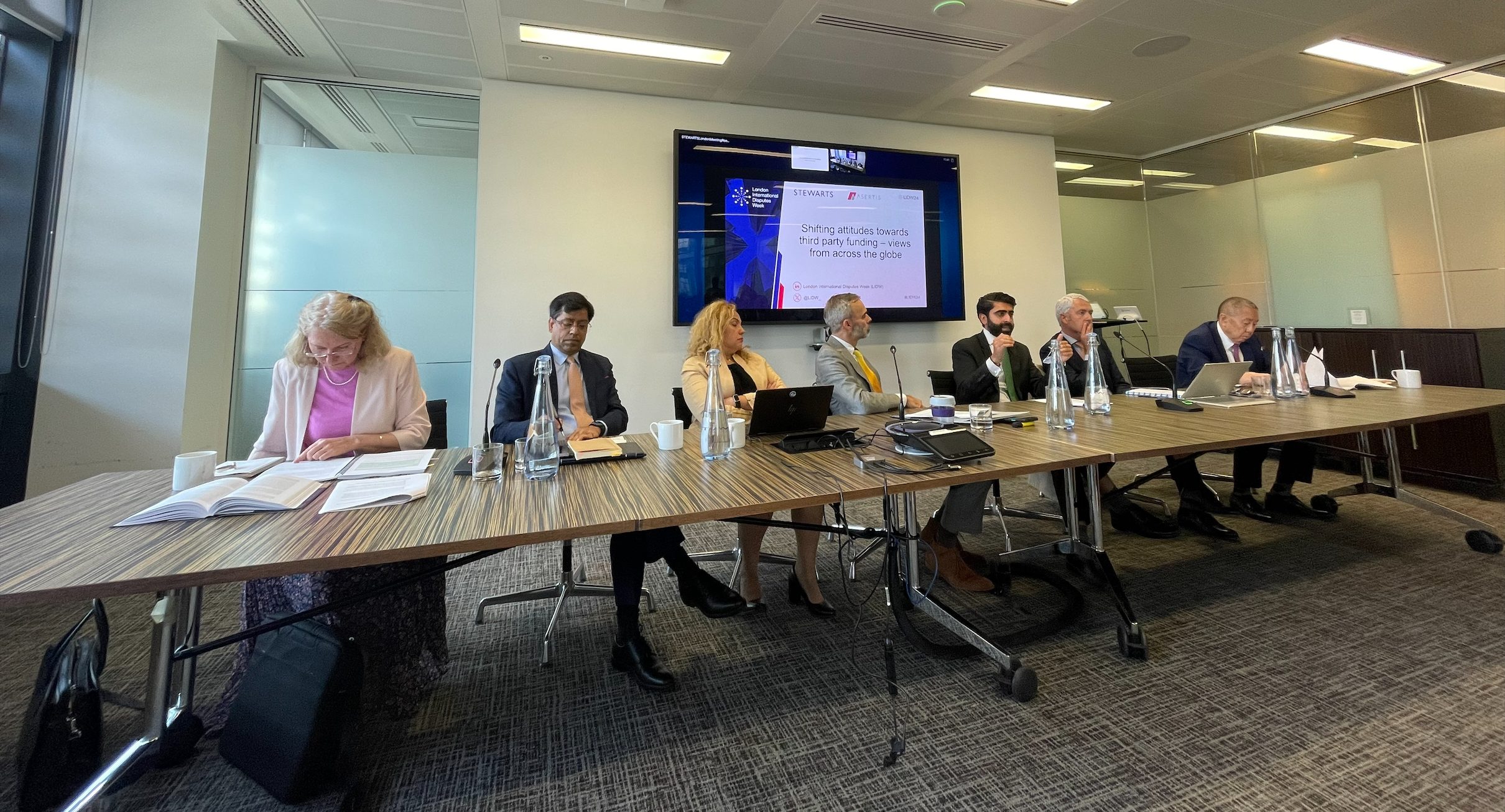Writing for the June edition of Litigation Funding magazine, partners Marc Jones and Julian Chamberlayne explained why a litigation funding Bill was quickly introduced in Parliament prior to the ensuing general election, and its context within broader consideration of the funding landscape in England and Wales.
The Supreme Court’s shock decision in PACCAR threw into doubt the continued access to justice of tens of thousands of individuals and business claimants. It demanded urgent government action, a point emphasised by Alan Bates’ vocal and timely support for litigation funding in the sub-postmasters’ battle against the Post Office. Thankfully the government has moved with truly impressive speed to deal with the problem by introducing the Litigation Funding (Enforceability) Bill (“the Bill”) in the House of Lords. Since its First Reading in the Lords on 19 March 2024 the Bill has made rapid progress and could become law before Parliament’s summer recess.
Retrospectivity
The most contentious aspect of the draft legislation has been its proposed retrospectivity. Laws should be clear, open and prospective – so that we can know what the law is and act in accordance with it at the time we act. It is obviously unfair to make a lawful act unlawful after the event. As a general rule Parliament does not enact laws with retrospective effect, and rightly so, but it’s not an absolute rule. Initial objections to the bill have diminished because the same objections do not apply when the effect of retrospectivity is to bring a law into line with society’s (mis)understanding of it.
In terms of its effect, the result of the Supreme Court’s decision was the same as if Parliament had changed a law retrospectively, making past lawful actions unlawful. But the Supreme Court’s decision is technically not retrospective because under English law judges don’t change the law, they discover and declare it. So, the scope of section 58AA set out by the Supreme Court was always the law, it’s just that society was mistaken about it.
In PACCAR, a serious lack of clarity in the law demonstrated as much potential to create injustice as retrospectivity. The bill’s practical effect will be to remedy the injustice caused by that lack of clarity and restore an entire industry (funders and claimant) – that Parliament created as a fundamental part of access to justice – to the position they believed themselves to have been over the last 12 years (since s58AA was added to the Courts and Legal Services Act 1990 in 2009). Nobody will better or worse off than they bargained for. Set against the alternative – a few opportunistic parties will lose the chance to wriggle out of contracts and make undeserved windfalls – it is difficult to see why acting to restore the status quo ante is at all objectionable.
More importantly, the full extent of PACCAR’s effect has yet to be determined. Whether all non-recourse funding (multiple-based, not just percentages) is unenforceable is an issue that is making it way to the Court of Appeal. While it would seem to be an extraordinary proposition, and first instance decisions have dismissed it, we only need to cast our minds back to last summer and the shock of PACCAR to remind ourselves that there is no room for complacency. The Bill’s retrospectivity is essential both to remedy the immediate problem and to remove the risk of a bad situation being made far worse.
Funding agreements
Though the Bill has been promoted as reversing the Supreme Court’s decision in PACCAR, its long title is more accurate: “A Bill to amend section 58AA of the Courts and Legal Services Act 1990 to make provision about the enforceability of litigation funding agreements”. The Bill will not technically reverse PACCAR but will instead nullify its effect. The decision in PACCAR hinged on whether litigation funders fell within the definition of “claims management service providers”. PACCAR determined that they do, and the Bill does not change that. Instead, it provides that “an agreement is not a damages-based agreement if or to the extent that it is a litigation funding agreement”. An LFA is defined as one which provides that “a person providing claims management services the (“funder”) is to fund (i) the provision of advocacy or litigation services (by someone other than the funder) to the recipient of the claims management services (“the litigant”)”. At first blush that would seem to do the job. However, there are still aspects of the drafting that must be improved to avoid the potential for further litigation undermining the legislative intent behind the Bill.
For instance, an amendment introduced on 29 April 2024 expands the definition of an LFA: “or (ii) where the litigant is a litigant in person, expenses incurred by that litigant”. Introducing the amendment Lord Stewart said: “As drafted, the definition of an LFA does not include reference to an agreement to pay the expenses of unrepresented litigants, which may occur where, for example, an unrepresented litigant receives funding for an expert report—a report from a skilled witness. Since the expert would not be providing “advocacy or litigation services” within the meaning of the legislation, an agreement to provide funding in this instance would not qualify as an LFA within the current draft definition”.
The problem is that the definition does not include an agreement between funders and represented parties for the payment of expenses (such as expert fees or ATE premiums). On the current drafting, would a percentage-based funding agreement that covered expenses not qualify as an LFA (and therefore be a DBA) or would it be an LFA to the extent that it funded litigation services but a DBA insofar as it funded expenses (similar to the approach taken in Zuberi)?
The bigger picture
Efforts to reverse the effects of PACCAR have coincided with the high-profile enquiry into the Horizon scandal, where Alan Bates has highlighted the essential role litigation funding played in enabling sub-postmasters to take the Post Office to court. The combined effect has been to push litigation funding more broadly into the spotlight. That may have been the catalyst that led the government, when it announced the Bill, to confirm it was considering a wider review of litigation funding.
The CJC subsequently accepted the Justice Minister’s invitation to undertake that review and formed a working group. The CJC aims to move quickly, with a plan to deliver an interim report this summer and their full report by summer 2025. Their remit is to explore access to justice, effectiveness and potential regulatory options for third party funding, then make any recommendations for reform.
Funders should be receptive to a well-informed review of funding and those we have spoken to are open-minded about possible regulation of the sector in relation to matters such as transparency, disclosure and capital adequacy. What would be a mistake however would be to introduce caps on funding terms. This would mean far fewer cases being eligible for funding. Cynical defendants can and do attempt to stifle claims, not by winning on the merits but by forcing claimants to exhaust their funds.
As disclosures in the Horizon scandal enquiry have shown, the Post Office’s lawyers pledged to “stretch out the litigation process so to increase costs in the hope that the claimants, and more particularly their litigation funder, decide that it is too costly to pursue the litigation and give up”. Imposing caps would risk further encouraging and rewarding such appalling conduct.
In the Lords’ debates on the Bill, the former Lord Chief Justice Lord Thomas of Cwmgiedd gave further reason why full-blown regulation of funders may not be necessary: “Australia has a lot of experience of how to deal with this, looking not to the creation of yet another regulatory body but to whether the courts themselves, through the Civil Procedure Rules, can be given the powers and guidance necessary to deal with the issues.”
An existing safeguard for claimants seeking funding is that they will inevitably be represented by a regulated solicitor with all the duties and safeguards that entails. If that solicitor lacks the skills and experience to advise on choice of funder and funding terms, then they ought to introduce the claimants to a specialist who can provide discreet advice. Getting this wrong or simply failing to advise could cost their clients, or their PII, dearly.
Hopefully the renewed public interest in the importance of funding to access to justice will cause the Ministry of Justice to revisit the DBA Regulations and introduce the well-received and uncontroversial refinements which Professor Rachael Mulheron and Nick Bacon KC proposed way back in 2019.
Taken together, the Bill (once enacted) and the DBA Regulations (once amended) would provide a clear and solid foundation for funders and law firms to provide the financial backing to level the playing field for claimants and enable them to obtain justice against even the most well-resourced defendants.
You can find further information regarding our expertise, experience and team on our Litigation Costs and Funding page.
If you require assistance from our team, please contact us.
Subscribe – In order to receive our news straight to your inbox, subscribe here. Our newsletters are sent no more than once a month.






